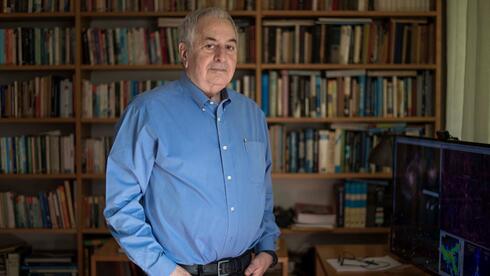Prof. Avishai Dekel, one of the world’s leading astrophysicists and a central figure in shaping modern cosmology research in Israel, died Monday at 74.
Dekel spent decades as a professor at the Hebrew University of Jerusalem and published hundreds of groundbreaking studies on the structure and evolution of the universe. His funeral was set to be held Tuesday at noon at the old cemetery in Herzliya.
Born in Jerusalem and raised in Ashkelon, Dekel served as an armored corps officer in the Israel Defense Forces and was wounded during the Yom Kippur War in battles in the Sinai Peninsula. He later commanded a reserve battalion with the rank of lieutenant colonel.
After completing his military service he studied physics and mathematics at the Hebrew University. His doctoral work, among the earliest in Israel to tackle cosmology, focused on the formation of structure in the universe.
Dekel went on to hold research and faculty positions at Yale University, the University of California and the Institute for Astrophysics in Paris. After returning to Israel he became a driving force in establishing the country’s modern cosmology community. He headed the Racah Institute of Physics and promoted science education for youth through the university’s Community and Youth Division. He also served as president of the Israel Physical Society and received the Landau Prize for his work on a model showing that streams of cold gas play a key role in shaping early galaxies.
Over his career Dekel coauthored roughly 400 scientific papers. In 2009 he helped develop a model describing how galaxies form in the early universe, challenging the prevailing view that stars formed mainly through galactic collisions. Several years later researchers detected cold gas streams, mainly hydrogen, in two galaxies, confirming predictions made by Dekel and his collaborators.
Dekel also led a team that predicted the existence of massive disk galaxies less than a billion years after the Big Bang. Observations with the ALMA telescope later identified such a galaxy, supporting the team’s forecast.
He received the Landau Prize of the national lottery’s Fund for Science and Culture in 2020 for his contributions to space research. In an interview with Ynet and Yedioth Ahronoth that year he spoke about the unresolved mysteries of the universe, including the nature of dark matter and dark energy. “Most of the matter in the universe is dark,” he said. “We know it exists but we don’t know what it is. What I hope is that in the coming years we will detect dark matter in a laboratory and understand what it is made of.” He added that dark energy, which drives the accelerating expansion of the universe, remains an even greater puzzle.
In 2021 Dekel and colleagues at the Racah Institute published research on galaxies that appear to lack dark matter. He explained that only in massive galaxies in the early, denser universe were small colliding galaxies compact enough to heat dark matter efficiently. Massive galaxies at that early time also hosted supermassive black holes that rapidly absorbed nearby material and produced powerful outflows.
In 2023 another study involving Dekel found that the dense, low-metallicity conditions in the earliest galaxies allowed stars to form efficiently and without disruption from neighboring stars. “Already within the first half billion years we identified galaxies containing about ten billion stars, similar to our sun,” he said. The discovery surprised researchers and prompted debate over whether star counts had been overestimated or whether elements of the standard Big Bang cosmological model require revision.

